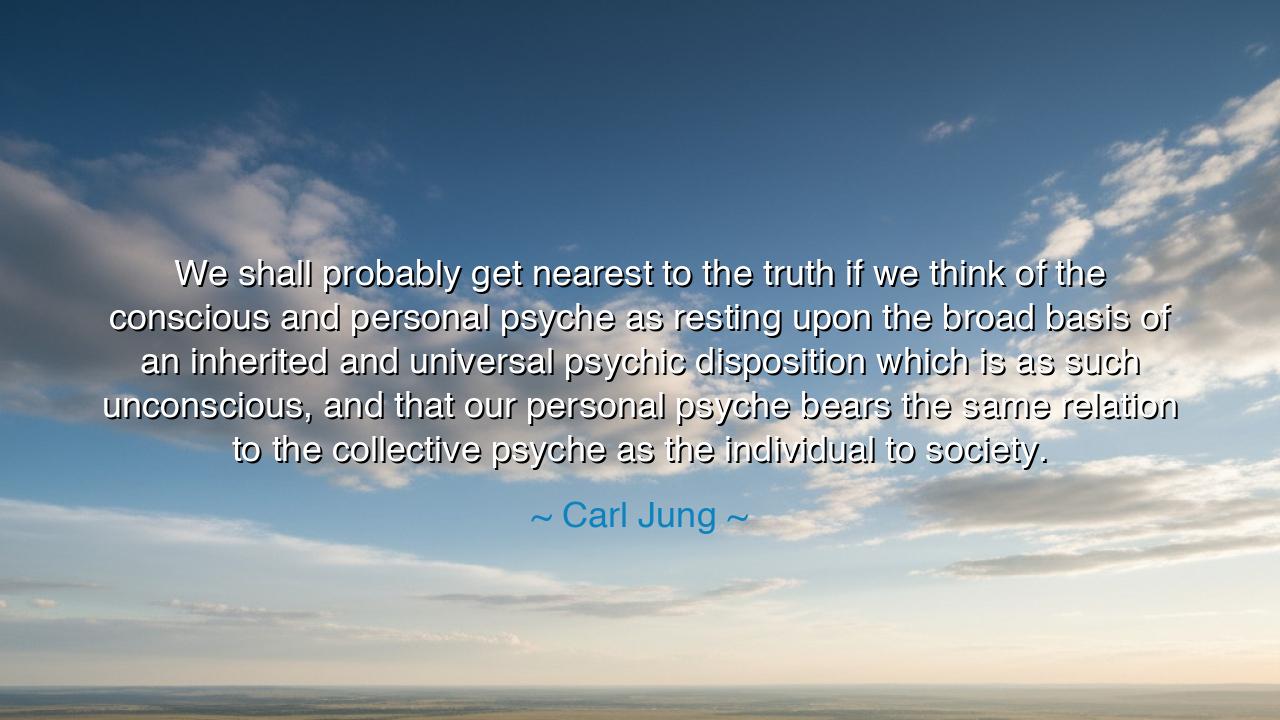
We shall probably get nearest to the truth if we think of the
We shall probably get nearest to the truth if we think of the conscious and personal psyche as resting upon the broad basis of an inherited and universal psychic disposition which is as such unconscious, and that our personal psyche bears the same relation to the collective psyche as the individual to society.






Hear now, O seekers of wisdom, the words of a man whose mind delved deep into the very nature of the human spirit, whose understanding of the soul transcends the boundaries of time and place. Carl Jung, the great visionary, spoke thus: "We shall probably get nearest to the truth if we think of the conscious and personal psyche as resting upon the broad basis of an inherited and universal psychic disposition which is as such unconscious, and that our personal psyche bears the same relation to the collective psyche as the individual to society." These words are not merely reflections on the human mind; they are a key to unlocking the mystery of our very existence. For in them, Jung speaks of a truth far greater than the individual soul, a truth that binds us all together, from the depths of time to the future.
What, then, does Jung mean by this? Let us first consider the personal psyche—the conscious self, the part of us that is aware of itself, the part that speaks to us in our waking moments. It is through this consciousness that we navigate the world, that we know our own thoughts, desires, and fears. And yet, Jung tells us that this conscious mind does not stand alone. Beneath it, stretching far and wide like the roots of an ancient tree, lies a collective psyche—an inherited, unconscious foundation that is shared by all human beings. It is the bedrock upon which the personal psyche rests, a vast, unseen force that influences our thoughts, actions, and even our dreams. In this way, the individual mind is not isolated, but interconnected with something much larger—something that binds humanity together across time and space.
Consider, if you will, the great myths and stories that have been passed down through the ages. From the epic of Gilgamesh to the tales of Hercules, from the sacred texts of the East to the parables of the West, we see again and again the same archetypes—the hero, the wise old man, the trickster, the shadow. These figures are not the product of any one individual’s mind, but of the collective unconscious that Jung speaks of. They are symbols that resonate deeply within all of us, regardless of culture, language, or time. These archetypes are not mere stories, but blueprints of the human experience, deeply embedded within our collective psyche, shaping the way we view ourselves and our world.
Let us turn now to the story of the great Greek philosophers, those whose thoughts shaped the foundation of Western thought. Men like Socrates, Plato, and Aristotle did not simply reflect on their own personal lives, but on the universal nature of humanity. They understood that the individual’s soul was not separate from the soul of society. The great ideas they expressed—ideas about justice, virtue, and knowledge—were not born in isolation, but were reflections of something greater. They tapped into the collective unconscious of their time, drawing upon the shared wisdom of those who came before them. These thinkers, like all of us, were part of a larger whole, one that transcended the boundaries of their own personal experience.
And so, we must understand that the personal psyche does not exist in a vacuum. It is shaped, molded, and influenced by the larger, unconscious forces that flow through the veins of humanity. It is the same with the society in which we live. Just as the individual is shaped by the collective, so too does the society shape the individual. The way we think, the way we behave, the way we perceive the world, are not simply the result of our own personal experience, but the product of a shared cultural psyche—an inherited wisdom that is passed down from one generation to the next.
Let us then draw from this ancient wisdom and consider the lesson it teaches us. The individual is not alone in the world; they are connected to something much larger—something that binds all of humanity together. Our thoughts, our dreams, our desires are not entirely our own, but are part of the larger tapestry of human experience. We must recognize that our actions, our choices, and our perceptions have an impact not only on ourselves but on the collective—on society, on the world, on future generations. We must learn to listen to the deeper currents of the collective unconscious, for in doing so, we tap into a wisdom that is far older and more enduring than the fleeting thoughts of the individual mind.
In our own lives, let us strive to understand the interconnectedness of all things. Just as the individual psyche is shaped by the collective, so too must we understand that our actions and choices shape the world around us. Let us be conscious of the archetypes that dwell within us, those ancient figures that speak to our deepest fears and desires. By acknowledging them, we gain the wisdom to shape our own lives, and in doing so, contribute to the greater whole of humanity. The path to self-understanding and self-mastery is not only a journey inward but a journey outward, toward the collective truth that binds us all.






AAdministratorAdministrator
Welcome, honored guests. Please leave a comment, we will respond soon